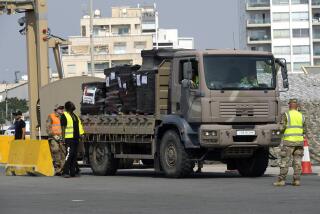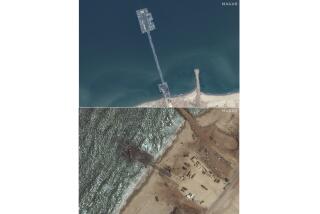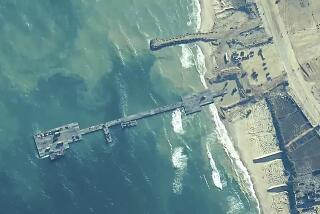Iraqi Trade at Aqaba Seems to Stop : Jordan: Idleness at the cargo docks contrasts with frenetic activity at a ferry pier, where thousands of refugees await ride home.
- Share via
AQABA, Jordan — Shipping bound for Iraq appeared to have reached a standstill Tuesday at the Jordanian port of Aqaba, with the last two Iraqi vessels to arrive sitting idly dockside and shippers vainly waiting for more to arrive.
Private shippers reported that American warships were stationed at the mouth of the Gulf of Aqaba, Jordan’s sole outlet into the Red Sea and the Suez Canal, and that Iraqi-flagged vessels and other freighters with Iraqi cargo were being turned back.
Overall, activity at the usually busy port seemed to be virtually strangled. Empty trucks parked on the roadway outside the port, and drivers said they had been waiting for days without receiving a call to pick up cargo.
Idleness at the cargo docks contrasted sharply with frenetic activity at a ferry pier, where thousands of Egyptian refugees from Kuwait were lining up for passage to Egypt. Scores of buses were carrying the Egyptians from the Iraqi border, where they had arrived after long trips across the desert from Kuwait.
“The ships coming in are decreasing, and the Egyptians are increasing,” said Dureid Mahasneh, a local government official.
The two Iraqi ships docked in Aqaba on Tuesday had both arrived over the weekend, shippers said, apparently skirting the U.S.-enforced blockade in the Red Sea. One, the Zain Al Qaws, carried a variety of cargo and the other, the Kwahla Bint Alazwar, unloaded automobiles.
The Zain Al Qaws had been pursued by an American naval vessel but refused to heed warnings to stop. Freight forwarder Ahmed Amro claimed that shots were fired across its bow.
In all, eight ships were docked or anchored at Aqaba. Only one, a phosphate boat, was taking on cargo. Phosphate is one of Jordan’s leading exports and makes up a third of the tonnage that leaves Aqaba each year. The rest of the ships were riding high in the water and appeared empty.
Normally there are up to 25 ships in the harbor.
Shippers said that wheat silos were almost empty.
The reduction in shipping was creating resentment among townspeople, many of whom sympathize with Iraq and the government of strongman Saddam Hussein.
Tourists were canceling vacations in Aqaba, hotel owners said, and the hotel beaches were less populated than a week ago.
“Already we are having to lay off workers at the port and in hotels,” Mahasneh said. “We think America has gone too far.”
Mahasneh predicted that Jordanians will continue to send food and medicine to Iraq. “You will not find a Jordanian unwilling to send food, even if he has to take it in his own car,” he said.
The flow of refugees made a dramatic picture at the ferry dockage. Egyptians clamored to get on board the King Hussein, a passenger boat named after the Jordanian leader. As it docked Tuesday morning and Egyptians rushed to get on board, Jordanian police kept them in line with makeshift whips of cord and rope.
About 6,000 Egyptians, mostly migrant workers fleeing Kuwait, were waiting in Aqaba on Tuesday. At a village farther north, 7,000 more were being delayed until the tide of refugees in Aqaba receded. And at Maan, farther north, 12,000 Egyptians were camped beside buses and cars waiting to move down the highway.
Jordanian officials claimed to know nothing of reports that Egypt had asked Israel to permit the refugees to pass overland across a sliver of Israel and into Sinai. In any case, five ferries were due to make the crossing to the Egyptian port of Nuweiba on Tuesday.
About 1,200 Sudanese refugees were camped at a public beach awaiting a ship to take them home. They gathered in clumps under shelters normally reserved for bathers; at first glance, it all looked like a huge picnic until the piles of luggage under the shelters came into view. The Jordanian government was providing bread, cheese and water for the refugees.
The increasingly sullen mood in Aqaba was expressed by many. “We don’t like (President) Bush,” said a taxi driver waiting in vain to pick up a tourist fare.
Security was also tightened around the port. Photographs of ships--and for that matter, of refugees--were prohibited by police.
A glass-bottom-boat operator told reporters that a friend was jailed for letting an Italian television crew tape shots of Iraqi ships in the harbor from his small vessel.
More to Read
Sign up for Essential California
The most important California stories and recommendations in your inbox every morning.
You may occasionally receive promotional content from the Los Angeles Times.













